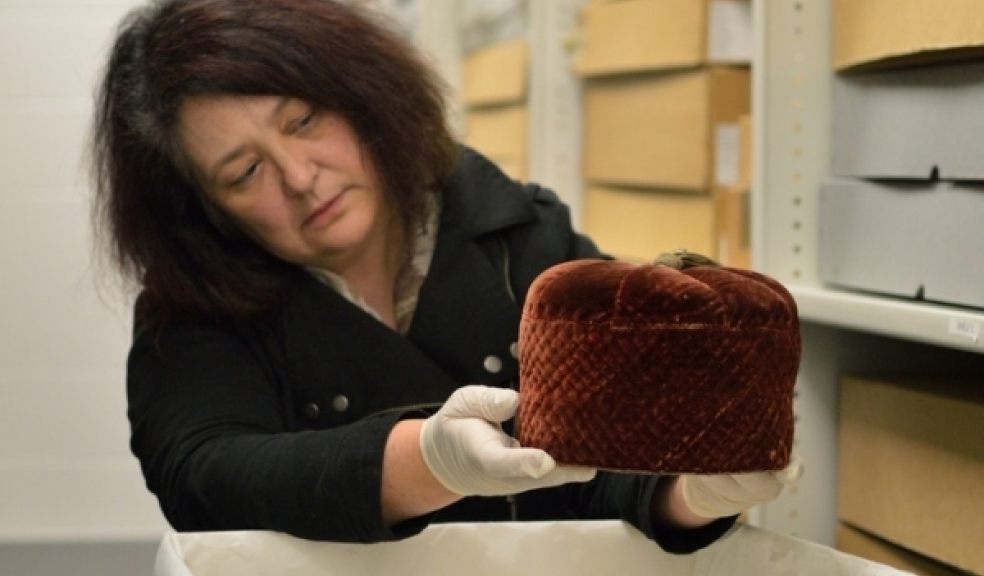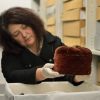
Rediscovering a Turkish Delight
A comment in a donor file has begun an intriguing search involving international commerce during England’s Civil War, silk togs, and a fake letter that may have finished a career... Shelley Tobin, RAMM’s Curator for Costume, reports:
Family treasures
A silk robe and quilted velvet tarboush (hat) were presented to RAMM in 1965 by Miss Mollie Prideaux, who referred to herself as the only surviving member of her family who knew their origin. They had belonged to an ancestor, Edward Barnard, not to be confused with the famous seventeenth-century philosopher and astronomer. Mollie claimed that Edward had been sent to Syria as an ambassador by Charles I.
RAMM’s Collections Review:
The robe and hat themselves raise many questions and as part of Collections Review we are looking deeper into the provenance of our objects and in time hope to be able to answer some of the questions about the exact origins and date of these pieces.
Trade with the Ottoman Empire.
A little research has already revealed that Edward Barnard was posted to Turkey and Syria between 1635 and 1649, and the reason he was there was to trade in preserved fruits, in other words, currants. Not everybody likes dried fruit. They are the healthy lunchbox alternative to chocolate bars that this Mum always found leftover at the end of the school day. These days imported foods are taken so much for granted we can take them or leave them. But in the sixteenth and seventeenth centuries dried fruits were in great demand and the trade in currants was bread and butter to many British traders.
The Turkey Company, later known as the Levant Company, was founded by Elizabeth I to deal with the lucrative ‘Turkey trade’ in currants and other commodities. The Levant Company developed from an amalgamation of the Turkey Company and the Venice Company in 1592. An opportunity to trade in the Levant offered a guaranteed route to riches, particularly for the ‘wealthiest and ablest merchants in the City’ according to one mid seventeenth-century writer. British traders flocked to the main centres of commerce in Istanbul, and Smyrna (now Izmir) on the Aegean coast of Turkey, Aleppo in northern Syria and across the Middle East. With a great position on the trade route between Europe and the Far East, Aleppo was seen as a comparatively safe place for European merchants to deal and exchange. Goods were brought in to England via Bristol and Exeter, often stopping off on the Italian coast en route.
Our man in Syria
Edward Barnard, a Westcountry man, was appointed English Consul to Aleppo by Charles I in 1635-8. His role appears to have been to smooth relations between dealers and merchants in Aleppo, but he was also a merchant himself. Consuls were not always paid. Those who were offered a salary were prohibited from trading themselves, or if offered half the amount of pay they were granted the license to trade in their own right. There were often disputes between merchants and delays followed, as reported by Giovanni Soranzo, Venetian Bailo at Constantinople, to the Doge and Senate:
‘The English ships are held up by contrary winds, but even more by disputes between the ambassador and the merchants.’ Little is known about Edward outside his career in Syria, which continued until 1649, when he may have been recalled to England after the demise of the king. A small footnote to a Venetian ambassador’s report suggests that although recommended for the position of Ambassador to Aleppo, and favoured by the Parliamentarians in England, Edward was pipped to the post by Sir Thomas Standish. There appears to have been a dispute over a letter from Charles I confirming Barnard’s appointment as ambassador, which the other merchants claimed to be a fake. As a result the ship loaded with Edward’s cargo was not allowed to leave port. Whatever else happened, according to family tradition Edward took home a silk robe and velvet hat as a souvenir, the only relic of his time in Syria.
Turkish robes
‘Turkish’ robes were a very popular form of masquerade or fancy dress for Europeans during the seventeenth and eighteenth centuries, and were often brought back to England. Robes of honour, or ‘hil’at’ were presented to distinguished visitors to the Sultan’s court as a mark of respect. The finer the quality of the textile and trimmings, the greater was the sultan’s regard. In some instances poor quality robes were given, or none at all, giving a very clear message to the recipient. Aleppo was one of Syria’s most important silk weaving centres, but imported textiles were also prized, including silks woven in Iraq and silks and velvets imported from Italy.
Now more research and an expert opinion are needed in order to establish the provenance and date of the robe and hat. In time we hope that the hat will be conserved and included in gallery displays. Watch this space for more news of currant affairs as they unfold.















